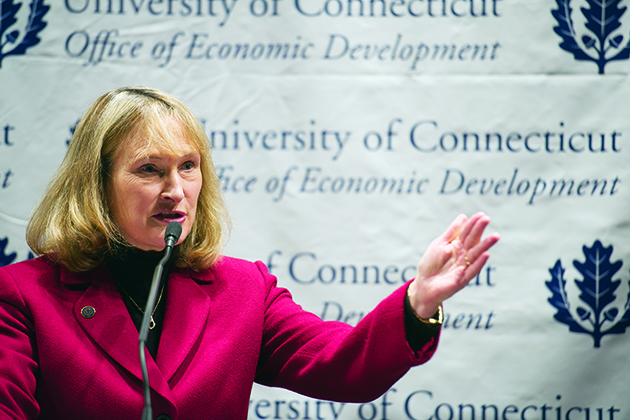
‘Start. Grow. Thrive’ is the new mantra for the state’s latest economic development initiative, the relaunched and rebooted Connecticut Small Business Development Center (CTSBDC).
The center is a five-year, $11.6 million program to provide financial and technical assistance to businesses with 500 or fewer employees – which accounts for roughly 93 percent of Connecticut employers. And UConn’s Office of Economic Development is in the driver’s seat.

The initiative was announced by UConn’s Vice President for Economic Development Mary Holz-Clause on March 6, during Connecticut Business Day at the state capitol. She was joined by Gov. Dannel P. Malloy, Commissioner of Economic and Community Development Catherine Smith, and President and CEO of the Business Council of Fairfield County Chris Bruhl. The initiative combines resources and funding from state and federal government, the University of Connecticut, and the state’s MetroChambers of Commerce.
More than 75 people attended the announcement, including Larry McHugh, President of the Middlesex County Chamber of Commerce and Chairman of the UConn Board of Trustees, as well as members of the press and representatives from the federal government’s Small Business Administration.

“The reinvigorated Small Business Development Center takes our economic development strategy to a new level, combining the academic strength and resources of our flagship university with the knowledge and reach of our chambers of commerce, to bring technical and financial assistance to the sector responsible for the overwhelming majority of our jobs: small businesses,” Malloy said. “When we talk about building a new partnership between state government and the business community, this is exactly what we mean.”
Smith, the state’s economic and community development commissioner, said, “With the passage of the governor’s Jobs Bill in October of 2011, we deployed a full spectrum of innovative assistance programs, and traveled the state telling businesses about them. What hasn’t gotten as much attention is the aggressive restructuring and integration of the state’s varied and disparate economic development efforts into a unified, agile, and responsive team that is focused on identifying and anticipating the needs of our private sector partners. The Small Business Development Center serves as an engine for that ongoing process.”
During the press conference, Holz-Clause pointed out that the University is an ideal home for the SBDC, as the power of UConn’s network of more than 100,000 alumni can be tapped to serve as both mentors and connectors for small businesses to ensure they are successful. In addition, the six regional campuses provide the SBDC with an established network of satellite sites that are already engaged in local, state, and national business development efforts.
“UConn is really focused on growing Connecticut’s economy from the ground up,” said Holz-Clause. “That’s why this partnership is such a perfect fit for us. It builds on some of our existing strengths and gives us a front-row seat for truly exciting developments in the state’s business community.”
UConn is already leading the way in boosting small businesses across the state, with initiatives like the School of Business’ Family Business Program, the Connecticut Center for Entrepreneurship and Innovation, Innovation East, and the successful Technology Incubation Program, which has attracted small technology companies from other states and currently incubates up to 40 companies that are generating revenues of more than $19 million this year alone.
The Small Business Development Center program, administered by the federal government’s Small Business Administration, has been providing service to small businesses for more than 30 years and is one of the largest professional small business management and technical assistance networks in the nation with over 900 locations across the country.
The SBDC in Connecticut was housed at Storrs until 2008, when it moved to Central Connecticut State University. Four years later, CCSU decided to focus on other initiatives and provided the state an opportunity to re-examine its approach to assisting small businesses in the state. UConn was tapped to re-invent the program to meet the new challenges Connecticut businesses face.
Over the past several months, the Office of Economic Development has been finalizing what the revitalized SBDC will look like. Led by Holz-Clause and Bruhl, the group has focused on developing SBDC’s core program offerings, trimming administrative costs, adding more counselors, and developing a new website (www.ctsbdc.org) that will feature a host of online tools for clients, including offering online software to boost a firm’s web presence and an online process for maximizing counselors’ time and effectiveness.
The program will fund 16 full-time positions and two part-time positions, with individuals located at each of the 11 service centers, including seven chambers and four regional UConn campuses, as well as the UConn campus in Storrs, and the Department of Commerce Export Assistance Center in Middletown.
“The new SBDC is designed to focus more like a private sector business: close to its customers, interconnected, efficiently using scarce resources, and offering a slate of innovative new services,” Bruhl said. “With a statewide network of 11 local SBDC offices, the Center strives to build the local ecosystem, recognizing that small business begins at the local level.”
For more information regarding the SBDC and its programs, please visit www.ctsbdc.org. To learn more about UConn’s Office of Economic Development, please visit www.innovation.uconn.edu.


